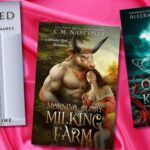
Poetry Through the Generations
This past Sunday, my family had an impromptu gathering at my grandparents’ house. With only 2 hours before my oldest sister Leasa needed to head back on her long, 6-hour trip home, we had a lot of catching up to do. But the conversation took a surprising turn. In the middle of discussing family matters, we started talking about poetry.
It began when my grandmother brought out an old library book and told us a story. Years ago, one of her friends quoted a line from an unremembered Elizabeth Barrett Browning poem — “The rest sit around and pluck blackberries.” My grandmother had refused to believe it written by Browning, arguing it didn’t sound ‘literary’ enough. In these pre-google days, she headed to the library to disprove her friend. However, she found nothing. Decades later, my grandmother finally happened upon the poem her friend had referred to — Aurora Leigh. She read us the stanza from the old library book, alarmed that indeed Elizabeth Barrett Browning had written that line. (Unfortunately, her friend is no longer living, so there can be no ‘I told you so’ moment.)
Then my grandmother took out another book. This one was small, each page with that distinctive typewriter lettering. The binding was secured by small, brightly colored pressed tiles, and typed on the cover page was a line of poetry, my mother’s name, and 1973.
Like most poems written during the teenage years, my mom’s poems in this handmade (and illustrated!) book are full of teenage angst, and also visceral descriptions. “Morning comes,” one untitled poem begins, “swept in by restless roaring waves / relentlessly gathering / all the gold-plated youthfullness / and hope of the rising sun / into their gray misted brutality.” Wow. Pretty dark, Mom! Yet despite the angst, the poem ends on a hopeful note, as some of the other poems do as well: “Acceptance / comes quickly to the skies, / and day settles calm / on a dreaming world / awakening.”
In terms of quality, these do not read like poems written by a teenager. They’re quite good (in my completely biased opinion).
As I read, Mom talked about poems that had inspired her as a teen, one in particular being “Patterns” by Amy Lowell. In “Patterns,” Lowell writes about a romance with her soldier fiance. The final stanza describes a letter she receives informing her he has died. The last line states “Christ! What are patterns for?”, a line my mother said struck her so much that even today she finds herself repeating it from time to time. It’s a poem that has remained with her throughout her life. I immediately added Amy Lowell: Selected Poems to my TBR list.
For me, the line that has remained with me from my teen years to now is from a poem by Sara Teasdale, “Barter.” I first read the poem in Love Songs, a book Mom gave me for Christmas many, many years ago. “Barter” describes a way of living for loveliness and ecstasy first, whatever the cost. The line that I’ve repeated off and on throughout my life is simple and short: “Holding wonder like a cup.” Even typing it just now the line resonates with me. That’s the kind of person I want to be. I want to hold wonder like a cup.
As we discussed and read poems, my grandmother emerged from the back of the house once more with a small black binder. Inside, surprise surprise, she kept her own teenage-penned poems. Each one was also typed, the pages punctured with holes and precariously secured within the binder. I was amazed. I’d no idea she’d written poems.
Folded into the back of the binder was a letter she’d sent to a publisher, along with one of her poems — “When April Comes.” My grandmother’s poetry reads much more hopeful than my mother’s. “We dreamed a dream together, you and I,” the poem opens, “And guarded it against the winter’s chill.” But this poem also tells the story of an unrequited love, a love that predates her relationship with my grandfather. It closes “My heart recalls the promise in those words, / “When April comes–” But April came today.” My grandmother’s beau never asked her to marry him, as she once hoped he would. She wrote this poem in 1948. The publisher rejected the poem, though he encouraged her to keep writing.
She did not. Neither did my mom.
But my sister and I continue to write poems (and I hope I can encourage my mom and grandmother to start back up). At some point during this conversation, Leasa shared her most recent poem — written last December — a bleak poem about perception and happiness, with a Snow White mirror theme. Not altogether dissimilar to my own poetry, though I see more of my mother’s obsession with nature in mine.
Poetry is such a solitary pursuit. It feels like a uniquely lonely act to read or write a poem. This visit reminded me how interconnected poetry can be. My grandmother, my mother, my sister and I all share this impulse to read and write poetry. And we can only enrich the process (and our relationships) by talking about it with one another. For example, I recommended Why I Wake Early by Mary Oliver to my mother, which she now plans to read, as I now plan to read Amy Lowell.
I hope we have many more such conversations. And maybe next time, we can all bring our recently composed poems to discuss.
What poems or poets do you share with your family?












